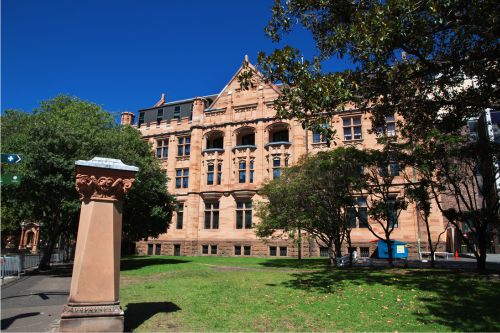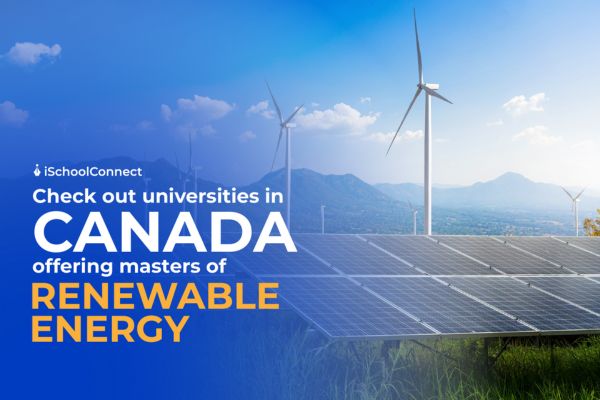Table of Contents
- Introduction to Master of Renewable Energy programs in Canada
- Why pursue a Master’s degree in renewable energy in Canada?
- Leading Master’s programs in renewable energy
- Top Universities in Canada for a Master of Renewable Energy degree
- Eligibility requirements for pursuing a Master’s degree
- Key takeaways
- FAQs
Introduction to Master of Renewable Energy programs in Canada
As the world shifts towards sustainable and eco-friendly energy solutions, the demand for professionals in the field of renewable energy continues to grow. Canada, known for its commitment to environmental preservation and innovative technologies, is a global hub of education. With a Master’s in Renewable Energy from Canada, students can learn to shape a greener and more sustainable future. In this blog, we will discuss the reasons why Canada’s Master of Renewable Energy programs stand out on the global stage.
Why pursue a Master’s degree in renewable energy in Canada?
Studying in Canada opens doors to a sustainable future with advanced programs, world-class facilities, and a growing renewable energy industry. There are a number of compelling reasons to pursue a Master’s degree in Canada, they are
Leading in renewable energy innovation
Canada is widely regarded as a global leader in renewable energy innovation and sustainable development. The country has made major investments in this technologies and has set lofty goals. Studying in Canada gives you access to excellent research facilities, modern technologies, and a thriving academic community.
Diverse and abundant renewable resources
Renewable resources are abundant in Canada, including hydroelectric, wind, solar, biomass, and geothermal. This variety provides students with a one-of-a-kind opportunity to explore based on their interests and career ambitions.
Strong industry connections

Canada’s renewable energy sector is growing, with several firms, organizations, and government programs devoted to the advancement technologies. Students can make significant relationships with industry professionals participate in internships, and access employment prospects by studying in Canada. These relationships provide practical experience and improve professional opportunities after graduation.
Sustainable policies and efforts
Canada has put in place strong policies and programs to help renewable energy thrive. Federal and provincial incentives and feed-in tariffs objectives are among them. Students who study in Canada acquire insights into the legislative structure and regulatory environment, preparing them to traverse the industry’s intricacies effectively.
International student-friendly environment
Canada is well-known for providing a warm and inviting environment for international students. A cosmopolitan society, safe cities, and world-class educational institutions are available in the country. International students benefit from the chance to network with friends from all over the world.
Leading Master’s programs in renewable energy

- The University of British Columbia (UBC)- UBC offers a Master of Engineering in Clean Energy Engineering, focusing on the integration of renewable energy systems and sustainable energy management.
- University of Waterloo- With its Master of Renewable Energy program, Waterloo provides a comprehensive curriculum covering solar, wind, bioenergy, and energy policy, preparing graduates for leadership roles in the industry.
- Simon Fraser University (SFU)- SFU’s Master of Resource Management offers a concentration in Renewable Energy Management, equipping students with skills to address global energy challenges.
- McGill University- Master of Science in Renewable Resources at McGill offers an interdisciplinary approach, exploring renewable energy’s scientific, policy, and economic aspects.
Top Universities in Canada for a Master of Renewable Energy degree
Here are the top ten universities in Canada according to the QS World University Rankings for you to consider while starting your Masters in Canada
| University | QS World University Rankings 2023 |
| University of British Columbia | 17 |
| University of Toronto | 23 |
| McGill University | 41 |
| University of Waterloo | 74 |
| University of Alberta | 112 |
| Université de Montréal | 171 |
| University of Calgary | 182 |
| Queen’s University at Kingston | 200 |
| University of Ottawa | 248 |
| McMaster University | 257 |
Eligibility requirements for pursuing a Master’s degree
The requirements for pursuing this course vary based on the university and program. However, the following are some general eligibility conditions that you may have to meet-
Academic background
A suitable undergraduate degree in a related discipline, such as engineering, environmental science, physics, chemistry, or a related subject, is often required. Some programs may accept applicants with diverse academic backgrounds, but they must demonstrate their expertise through preparatory coursework or relevant job experience.
Minimum GPA
For admission to Masters programs, most universities need a minimum Grade Point Average (GPA). It is usually around 3.0 or its 4.0 equivalent. A higher GPA may be necessary for competitive programs, scholarships, or funding options.
English language proficiency
If English is not your first language, you must demonstrate its proficiency by giving test scores from exams such as the International English Language Testing System (IELTS). Each university establishes its own minimum score requirements. An IELTS score of 6.5 is typically expected.
Letters of recommendation (LOR)
You may be required to submit LORs from academic or professional references who can evaluate your credentials, talents, and potential for success in a Masters’s program.
Statement of purpose (SOP)
Many colleges need a statement of purpose in which you describe why you want to pursue a Master’s degree in Renewable Energy, your career goals, and how the program helps reach your goals.
Résumé or curriculum vitae (CV)
You will most likely be required to submit a detailed resume or CV highlighting your educational history, employment experience, research projects, internships, publications, and other relevant accomplishments.
Key takeaways
- Pursuing a Master’s in Renewable Energy in Canada offers numerous advantages and opportunities for students passionate about sustainable solutions and environmental preservation.
- Canada boasts top-ranking universities offering specialized Master’s programs in renewable energy, each providing a unique approach to education and research.
- While eligibility requirements vary, having a competitive GPA, English language proficiency, letters of recommendation, a well-crafted statement of purpose, and a resume is necessary to apply for this course.
Did this article interest you? Share your thoughts and questions in the comments section below. We’d love to hear from you! Click here to reach out to us for more information. Our team is here to provide the guidance and assistance you need to kick-start your study abroad adventure.
Liked this blog? Read next: Master’s in Philosophy from New York University | Your handy guide
FAQs
Q1. Is Canada a leader in renewable energy?
Ans- Canada is a world leader in producing and using renewable energy, accounting for 17 percent of the country’s total primary energy supply.
Q2. What is the best degree to work in renewable energy?
Ans- Consider a degree in Chemistry, Biology, or Biochemistry to help you understand energy at the molecular level. With this degree, you could be working in a renewable energy lab in the near future.
Q3. Is renewable energy a good career path?
Ans- This field offer some of the highest-paying jobs in the power-generating field. According to the US Bureau of Labor Statistics (BLS), energy jobs pay between $80,000 and $100,000 per year.






